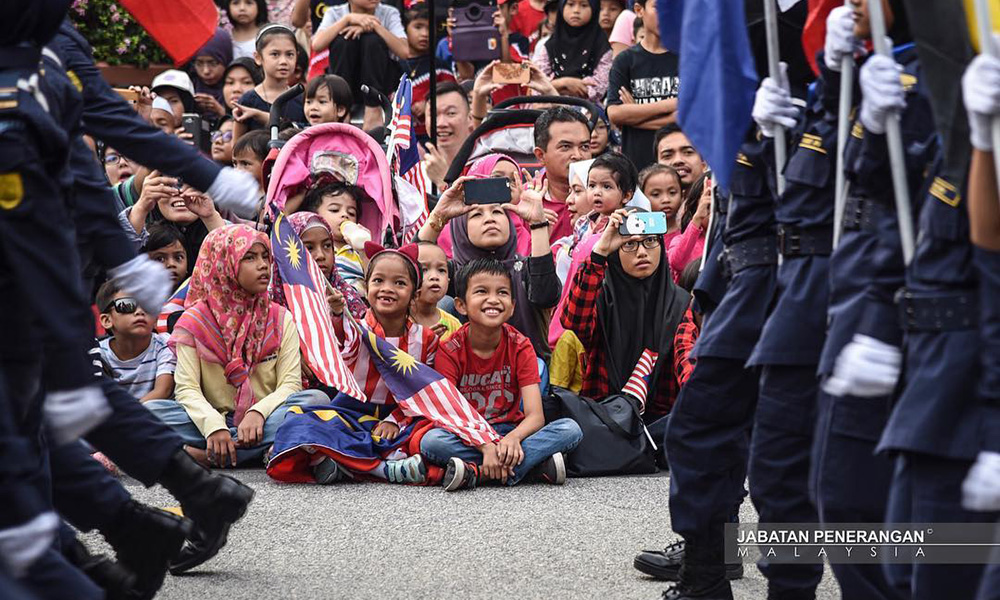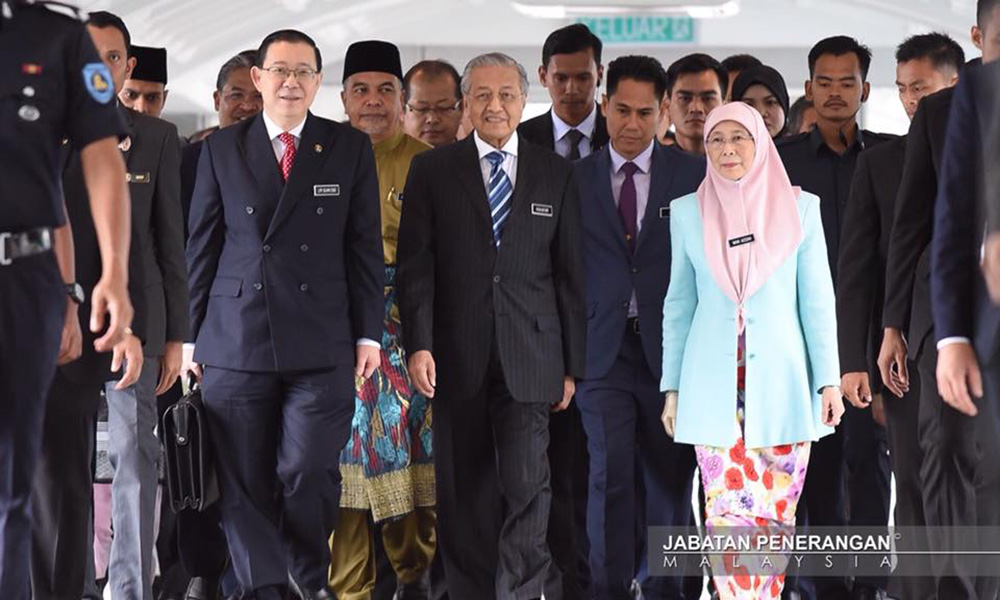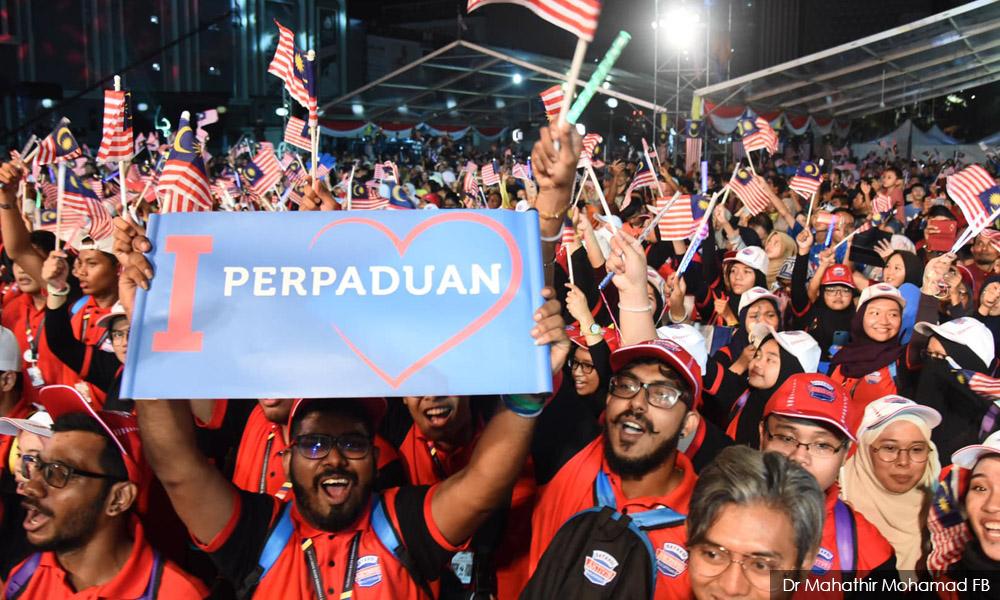A little over one year after the election of Pakatan Harapan, the dominant sentiment is not hope, but betrayal. When ministers break bread with those seen to be engaged in attacks against the nation’s social fabric, and elected representatives are charged with sexual assault, it is no wonder the level of anger of Malaysians has risen.
Sadly for some, an equating of Harapan with BN is misplaced, as many of their supporters are even angrier with this no longer new government for its perceived failure to uphold the principles they rode into office. With BN they knew what to expect. Harapan is seen not to have met expectations, and this crash in expectations has evoked strong reactions.
With citizens having vested so much emotional connection to a ‘New Malaysia,’ it has been a difficult year to watch the escalation of disappointment to a debilitating level of anger, distrust and cynicism.
The list of ‘successes’ (and there are quite a few of these) pales in relation to perceived lost opportunities, as the focus is on the areas where Harapan supporters feel cheated. Rather than a polarised electorate, Malaysia is now a combination of voters who feel displaced from power, and others who rather than be empowered, feel pulverised by the current government.
Increasingly, many who voted for Harapan feel used, taken for granted, and with the slowing economy, increasingly vulnerable.
Disenchantment and division
The reasons for the growing sentiment and anger have been laid out in the media over the last year. Open internal bickering and constant politicking within the governing coalition. Destructive elite positioning against each other. Ineffective and conflicting communication. Dominance of and buy-in to the PAS/Umno racial/religious narrative. The failure to embrace the middle ground and reach inclusive compromises. Inadequate clear future-oriented economic/national policies. This list can continue.
The causes of this growing divide between expectations and delivery lie both within the government and outside of it. The initial task Harapan faced, with inherited debt and decades of abuse of the system by those in power, was always going to be difficult. This was especially the case because it was not a regime change, but a change in government, with deep-seated mindsets and practices that were and are not going to change overnight.
Resistance inside the system is real – it is not the ‘deep state,’ but rather a shallow one in which sabotage and self-interest are the norm. Many of those inside the system are so vested in securing their positions, they have lost track of the interests of the country as a whole. Sadly, some of the new elite also seem to have adopted a view of entitlement that has added to public dismay. So much of the damage has been self-inflicted and unnecessary.

This Merdeka, the focus has been on division rather than unity, at a time when Malaysia is facing one of the most difficult transitions in its history. The country has been losing its competitive edge regionally. It is no longer seen as an economic tiger, nor is it attracting adequate investment to engender long-term growth.
Its labour force is inadequately educated for jobs in higher-paying positions and it overly relies on foreign labour in its manufacturing sector. Salaries are too low to keep skilled labour in the global marketplace and the work culture does not adequately reward merit or hard work. The education sector is in urgent need of meaningful reform – not the shoe colour or khat script – but in enhancing technical and digital skills, as well as critical thinking.
Policies based on race hold every Malaysian back, especially the Malay community. The reality is that the regional and global environment is not as favourable as the past. Malaysia has to work harder to compete with the likes of Vietnam and Indonesia. Many Malaysians see these trends and are deeply committed to strengthening the nation.
Harapan needs to recover the goodwill of the people – and appreciate that this will be an uphill task. Rather than fight each other, the focus should be on being less parochial and positioning the country to manage the global and regional shifts.
Here are three constructive suggestions that can move Malaysia forward.
1. Bring in technocrats
First of all, it is important to appreciate that Prime Minister Dr Mahathir Mohamad has played a statesman role in bringing about the new government. His role and legacy for Malaysia’s development is firmly established. To date, however, in his second term, Mahathir appears locked in the past and has not presented a vision for the country’s future.
Worryingly, many of those around him appear to be vested in (re)establishing their financial positions, rather than that of the country. National cars are policies for the previous century. Similarly, embracing motorcycles for public transportation is also a step backward – with serious health and environmental risks that outweigh any benefits for the creation of low-paying jobs.
Now, more than ever, there is a need to seriously sit down and embrace new ideas in a holistic and thoughtful fashion. Planning through old bureaucratic procedures (five-year plans) will not address the core challenges facing the country, and, worse yet, further embed old silo practices and patronage that have gotten the country to the difficult crossroads it now faces.

The time is ripe to embrace more technocrats in government, to bring in those who have the skills, knowledge and creativity to move Malaysia through this difficult transition. This is not purely a matter of an advisory council – but empowering those with forward-looking technocratic knowledge to create programmes for the country’s future.
Technocratic knowledge is especially needed in education and the economy. All the advisers (and their immediate families) should not be allowed to use their positions for business to prevent conflict of interest in these positions.
2. Enhance cooperation
Second, the global economic outlook is worrying. Malaysia needs to position itself to manage a potential downturn and turbulence. There was to be an understandable national economic slowdown as contracts were stopped and spending slowed during the political transition. Much of the funds greasing the retail wheels were, in fact, ill-gotten gains. Yet, there needs to be greater appreciation of mistakes made after assuming office.
Mahathir’s further fragmentation of economic policymaking has made the situation worse. Decisions are made too slowly, as competition between individuals and ministries undermine each other. Foreign investors are skittish about the political uncertainties at the leadership level – as without a clear leadership transition timeline, there is a major obstacle for long-term investment. Foreign and local investors have a hard enough time navigating the different state agencies who work against each other in their investment promotion packages, rather than for the nation as a whole.
Facing the problems of visas and immigration – another department in urgent need of reform – is even more nightmarish. Malaysia urgently needs greater coordination of economic policy-making, a reduction in red tape (needless hours spent to get a simple stamp duty), and policies and leadership that are seen to be working in tandem with each other rather than at odds.
3. Deepen inclusion
This cooperation needs to extend into the society itself. The reactions to khat and Muslim preacher Zakir Naik speak to deep-seated insecurities and resentments that have built over decades. The stirring up of race and religious anger has been a political strategy for Umno and PAS for some time, but it would seem that some leaders in Harapan also pander to these sentiments.

Rather than sit down with those attacking Malaysia, a policy addressing the thousands of foreign spouses (mothers and fathers) of Malaysians who do not have permanent residency despite being in the country for decades could be an important step toward strengthening national cohesion. The underlying reasons for resentments and inequalities need to be addressed, rather than hastily (and incorrectly) dismissed. Denial is self-defeating.
There is nothing wrong with Malaysians embracing their identities. The country’s diversity is its strength – the great food, the multiculturalism, the music and languages. These differences add to the country’s durability in these uncertain times, and provide connectors for Malaysians to the outside world, notably China and India which are rising global powers. The key, however, is forging mutual respect and tolerance while appreciating that Malaysians are stronger together than apart. To date – policies in these areas have been lacking, and, in fact the displacement of minorities and vulnerable communities have persisted.
The divides in the society need attention. The recent United Nations report on povertyspeaks to the long-known misrepresentation of vulnerable conditions on the ground. One does not need to go far to see the suffering of those across the country in increasingly difficult economic conditions. It has long been time for a meaningful and holistic approach to address exclusion across race, gender, geography and generation. This report – which highlights that the bureaucracy has used flawed assessments – is an opportunity, rather than an obstacle, for development.
In these challenging times, the struggle for independence, for dignity, freedom and a better future, is ever-present. Despite the anger, there remains a deep commitment and goodwill toward strengthening Malaysia. Now more than ever, constructive leadership needs to work in tandem to maju Malaysia.
BRIDGET WELSH
– M’kini



Beyond question MM of Kerala thinks he is indispensable...at 95 he has lost his soul and power is what matters to him. Shame!
ReplyDelete